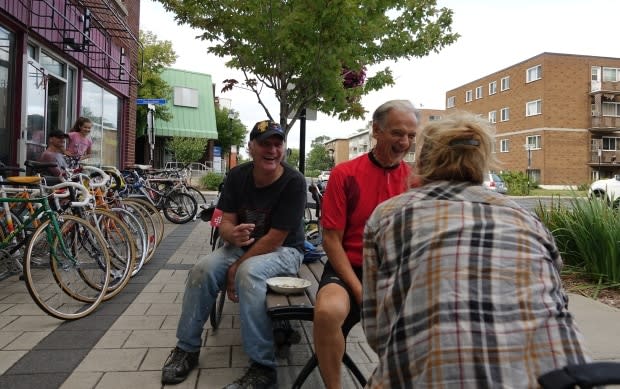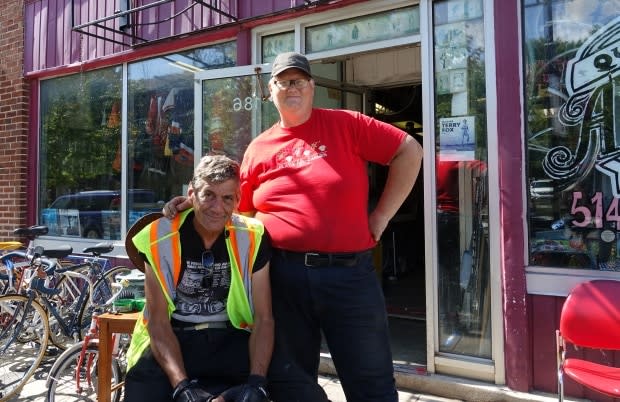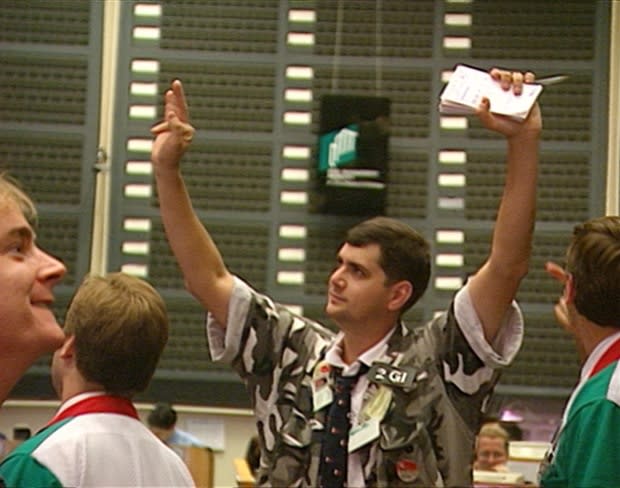This Greenfield Park shop doesn't only save old bikes — it's a 'haven' in the community

By the time Joey Vine showed up to his store in the early afternoon after volunteering at a nearby mission, someone was already waiting.
Marquis Dupasquier, sitting on a stool next to the shop's entrance, is like many of Vine's patrons in that he is also a friend. And if you were to stop by a few hours later that day in September, you might think the whole neighbourhood is pals with Vine.
"It's nice to come and just hang out. You don't get that at any other store," said Dupasquier, who had dropped by to see if Vine could mend a seized pedal.
Friends and shoppers alike come to Quinn Antiques to get their bicycles fixed and trade vintage bikes and records, but what they're really there for is Vine.
"With Joe, we talk about anything. We talk about the past, the present and the future," Dupasquier said. "He's an icon in the area."
Vine — a gregarious retired bond futures trader who sports a cowboy hat, shin pads and bright yellow vest to work — is in the business of making the old new again.
Many of the shining bikes neatly lined up in front of his store were once destined for the scrap yard. As Vine puts it, he "brings them back," giving them a new life and another "a decade or two" of use.
Vine, 55, has painstakingly built up the store he opened nine years ago in Greenfield Park. Today, it has become a community hangout and repository for miscellaneous objects: old cameras, magazines and dishes, an impressive collection of 10,000 records and the 40 or so 20th-Century bicycles outside.

Those bikes aren't supposed to be there, though. A City of Longueuil bylaw forbids merchants from displaying anything outside their store. Exceptions are made for establishments serving food, if they buy a permit.
Vine has tried to convince the city to issue him a permit, but he says that they've fined him "numerous times" instead.
At first, he paid the fines — amounting to about $4,000 — out of pocket. Then, construction overhauling the street in front of Quinn Antiques nearly drove him out of business.
"And it was: 'forget about it'," he said.
He opted to work the rest of the fines off in community service hours at the Mission Nouvelle Génération in Brossard.
It's been two years since Vine finished working off another $6,000 in fines, and he continues to volunteer at the mission every Tuesday and Thursday morning.
"I fell in love with the place," he said.

He established a program where he and two other mechanics fix bikes they find, and give them to the mission to sell at a low price. In exchange, the mission has created a space in their warehouse for them to work, amid stacked boxes of donations.
"This is our jungle," Vine said, walking inside. Bicycle wheels decorate the metal wall above a work table and bikes of different sizes lie all around.
The mission is also where Vine met David Phelps, a 49-year-old from Scarborough, Ont., who used to volunteer at the meat counter. On his breaks, Phelps would watch Vine work.
"I used to work on my own bike as a kid and I told Joe how I would fix it and he said, 'that's all wrong,'" Phelps said. Still, Vine saw in Phelps skills he didn't have.
"Bottom brackets, bearings, I can change a tire in under two minutes," Phelps said. "I do jobs that Joe just won't touch."
The two have now become inseparable.

When Vine graduated university in political science, he joined his father at the Montreal Stock Exchange. He started as a stock broker, then took a position as a bond futures trader with Merrill Lynch, then Goldman Sachs.
Eight years later, at 30, he became an independent trader. In the next 16 years, Vine said, he would grow "too old" amid an industry that was modernizing "too fast."

"Once [the Stock Exchange] computerized, it's you against the Borg. The whole world changes," Vine said, polishing a Czechoslovakian bike the colour of a robin's egg he dated to the early 1970s.
So he had to find a niche, he said. Not that the digital age has been any kinder to the world of antique stores.
"E-commerce has taken over, never mind Ebay, Facebook and all those sites," Vine said, starting to smile.
"The bikes? They're hard to ship. They don't fit in an envelope!"
The evening light was starting to set in and three of Vine's friends were laughing and drinking wine on benches outside. Vine's two youngest children, 11 and 12, rode a pair of cruisers he'd refurbished for them.
Phelps pulled up to the store in his silver Chevrolet Cavalier with a trunk filled with food he'd earned volunteering at the mission.

Philippe Abran, Vine's next door neighbour, and Steven Avila, a former employee, started the charcoal barbecue behind the store.
Abran says the group "saved me." After a painful separation, Abran says he started "from Square Zero." Vine and Phelps fed him at their daily barbecues, and Abran helped cook.
"I would actually have to go so far as to call it a sanctuary because it's just kind of a haven for people," Abran said.
Vine estimates he's put more than 500 bikes back on the road, not including those he's fixed at the mission. He hopes to make the program there "bigger and better," with more volunteers and equipment.
Each year, he says he sells more bikes at Quinn Antiques than the last — he was at 103 at the time of his interview with CBC News.

As Vine hauled the bikes back inside at dusk, Phelps was now the one on the stool by the door, keeping a watchful eye on the group as they finished their food.
"He's usually here until 9:30 at night," Phelps said of Vine. "He calls it the all-night bike shop and social club. I added the social club."
"The people who come by to see him are like an extended family to him. He protects them, they protect him."
"I feel that nothing can go wrong here."


